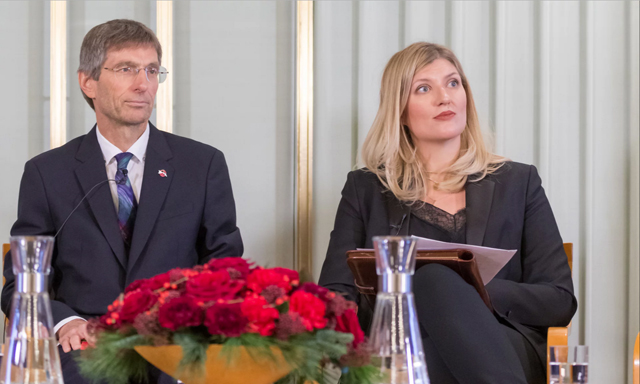The Australian government seems to take little pride in the fact that a handful of our doctors has won the world’s top gong.

Melbourne physician Tilman Ruff with ICAN director Beatrice Fihn. PHOTO: ICAN
Malcolm Turnbull is rarely stuck for words, but the award of the 2017 Nobel Peace Prize to an organisation founded in Australia has left him speechless.
The International Campaign to Abolish Nuclear Weapons, or ICAN, was set up a decade ago in Melbourne. ICAN’s current director, Swedish lawyer Beatrice Fihn, received the award at a gala ceremony in Oslo, Norway last week.
Geneva-based Fihn is one of just three salaried staff – the other two are in Australia – on the ICAN payroll. For an organisation that knows how to survive on almost nothing, the $1.42 million that comes with the prize promises a long future.
In early October, when the prize was first announced, a prime ministerial spokesman acknowledged “the commitment of ICAN and its supporters to promoting awareness of the humanitarian consequences of nuclear weapons”, adding that banning these weapons was not the answer.
Foreign minister Julie Bishop, who a fortnight earlier had stressed Australia’s commitment to “a world free of nuclear weapons”, made no comment. Both she and the PM remain silent.
To put ICAN’s achievement into context, five months ago this tiny organisation managed to win the support of enough UN member countries – 122 of them – to vote into existence the legally-binding Treaty on the Prohibition of Nuclear Weapons, which aims to eliminate these weapons entirely.
Every Latin American country, including Brazil, Argentina and Mexico, voted for the treaty. So did Ireland, Austria, Switzerland, Finland, nearly all African countries, Kazakhstan, Mongolia and most of the Middle East including perennial antagonists Saudi Arabia and Iran.
In our own region the treaty got the support of New Zealand along with Pacific island nations, Papua New Guinea, Indonesia, the Philippines, Malaysia, Vietnam, Cambodia, Thailand, Laos, Myanmar and Bangladesh. We alone opposed it.
The 71 countries against the treaty included the world’s biggest economies and nuclear powers, one of which, the US, was identified by Turnbull’s October spokesman as providing Australia’s best defence against nuclear attack in the form of “extended deterrence”.
The US “nuclear shield”, a key part of our US strategic alliance, has some serious imponderables. In her response at the Nobel ceremony last week, Beatrice Fihn pointed to one of them: the vulnerability of established norms and rules if leaders are prepared to ignore them.
At any time, said Fihn, a “bruised ego” and “a moment of panic” could bring on a nuclear crisis; “the deaths of millions may be one tiny tantrum away.” After the angry personal exchanges between Presidents Donald Trump and Kim Jong-un this year that’s not too hard to imagine.
In the US at least, military top brass have ways of stopping a nuclear strike ordered by a rogue commander-in-chief. But in a crisis, with jobs, reputations and lives on the line, who knows how things might play out?
Most strategic decisions, such as deploying troops and weaponry to a battlefield, take days or weeks to unfold – enough for other influences including public opinion to be brought to bear. But the speed of a nuclear strike doesn’t allow that.
Ever since atomic bombs levelled Hiroshima and Nagasaki in 1945 the world has sought to control nuclear weaponry with ideas like non-proliferation and limitation. The long string of bilateral and multilateral treaties since the 1960s is testament to that struggle.
But so long as nuclear weapons exist, there is no failsafe way to stop them being used, which is what impelled a group of doctors back in 2005 to go for broke.
Ronald McCoy, a Malaysian member of International Physicians for the Prevention of Nuclear War (which won the 1985 Nobel Peace Prize) suggested a global convention driven by a campaign to ban nuclear weapons. Colleagues in Melbourne took up the idea and ran with it.
Tilman Ruff, Felicity Ruby, Dimity Hawkins, Bill Williams and Tim Wright were among the Australian doctors who organised the launch of ICAN in Vienna in 2007: a cut-through moment in the long, weary saga of nuclear weaponry.
Bill Williams, who was a GP in Torquay, Victoria, when he died last year, saw ICAN as “a determined worldwide movement to outlaw and abolish nukes”. He went on: “We need to build the wave of public opinion into a mighty crescendo: a massive, surging, irresistible force which carries us all the way to absolutely zero nukes. Without it, even the most inspirational of leaders will falter on the way.”
The most pernicious of the many obstacles to a comprehensive nuclear ban is the silent treatment by nuclear powers and their acolytes – notably from the land that gave rise to ICAN, Australia.
Seventy years of debate and ten treaties have left us with tens of thousands of nuclear weapons still in existence. ICAN has put nuclear disarmament back on the table. We need to have this debate, and our leaders, inspirational or not, must understand that silence is not an option.
